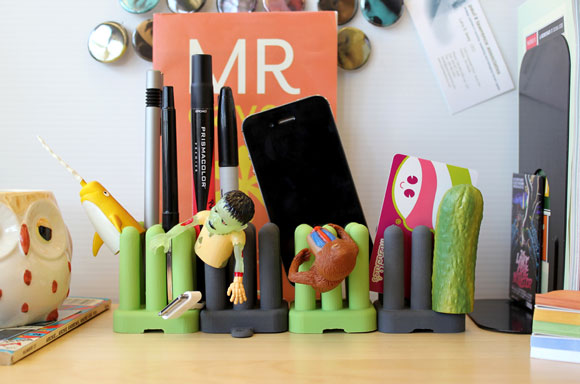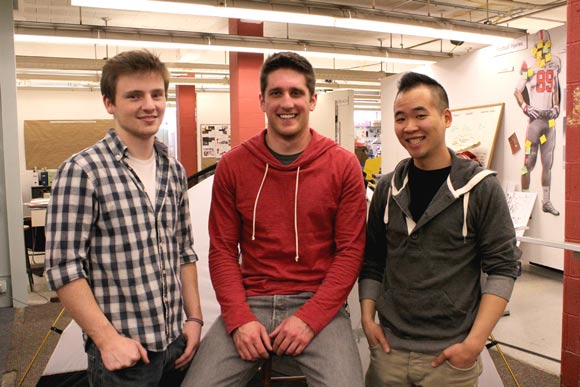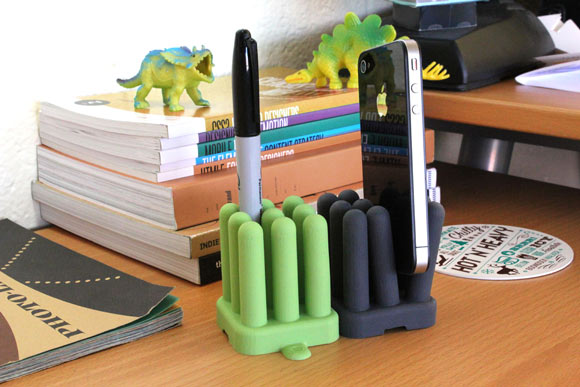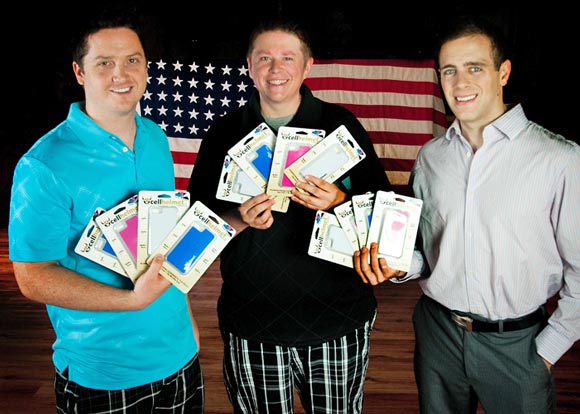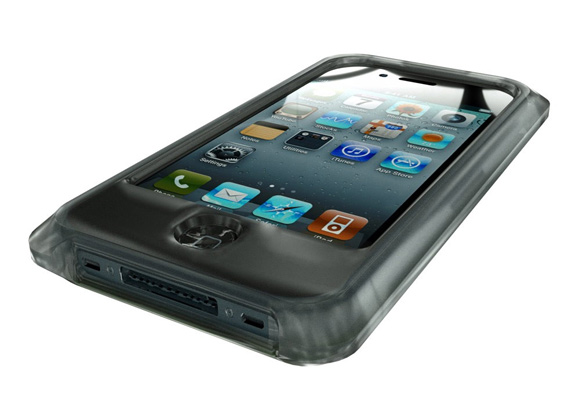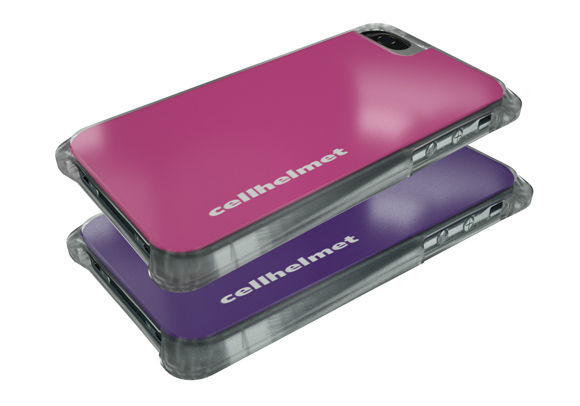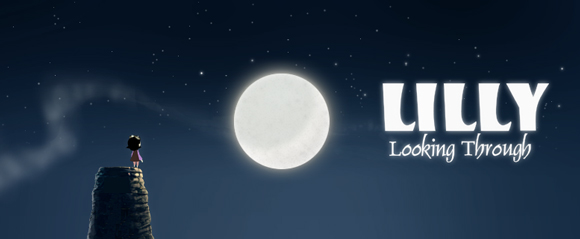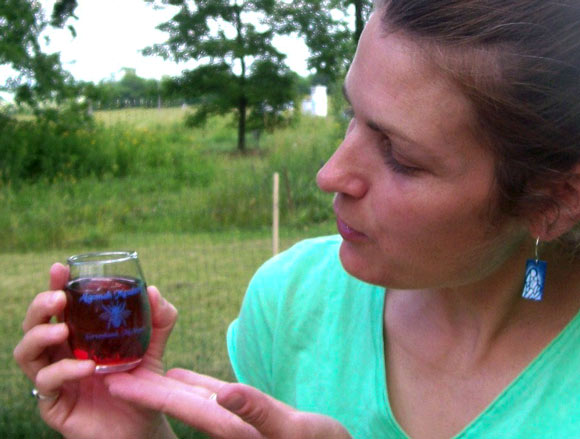make it here, there or anywhere: crowdfunding fuels startup companies in surprising places
Make it here, make it anywhere
If you’re an entrepreneur in the Midwest -- a region often considered “flyover country” by venture capitalists flocking to the coasts -- startup funding doesn’t always come easily.
Just ask Scott Davis, who quit his day job as a software consultant, lived off his savings and worked 60-hour weeks to launch his independent gaming company in Minneapolis.
“In the Midwest, startups need to be bootstrapped,” says Davis of QONQR, a location-based, multi-player strategy game that is played on smartphones. “There aren’t a lot of business-to-consumer Internet companies in the Twin Cities. We don’t have investors knocking on our door. If we knocked on their doors, they probably wouldn’t answer.”
Yet Davis and his partners, who met two years ago at Twin Cities Startup Weekend, have set out to prove that startups can be successful anywhere. They recently launched a Kickstarter campaign to raise gap funds that will allow them to grow more quickly. Their goal is to raise $25,000 in 40 days to build a “command center” for QONQR.
To reach this lofty goal, they are approaching friends, family and players for pledges. In exchange for committing $25 or more, backers will be able to download the new game.
Davis and his partners aren't alone. Turned down by banks and overlooked by venture capitalists, many entrepreneurs are turning to "crowdfunding" -- the burgeoning trend of using the Internet to raise small amounts of money from lots of people -- to raise startup funds.
Crowdfunding, which started as a way to fund artistic projects like a band’s next album, has evolved into a tool for startups to raise funds. Restaurants, shops, inventors and even high-tech startup companies are now using this approach to bootstrap their next projects.
“In the past few years, bank loans to small businesses have become all but extinct,” says Candace Klein, founder of the Cincinnati-based crowdfunding website SoMoLend. “Crowdfunding opens up a new channel for getting funds to small businesses.”
Testing new ideas
In addition to raising cash, crowdfunding sites like Kickstarter, IndieGoGo and Rockethub also help entrepreneurs test new ideas, develop a fervent customer base, and gain priceless marketing exposure.
“If you get a loan from a bank, you get a check and that’s all you get – you get no help,” says Mike Kane of Pittsburgh-based Cellhelmet, which recently raised $19,080 from 344 backers to create a protective smartphone case with a unique guarantee. “With websites like Kickstarter, you not only get a check -- you get customers, too.”
Kane crowdfunded his smartphone case in part so that he could soft launch his bright idea. “We were three guys putting out a product and telling people if your iPhone breaks, we’ll repair it. We needed a way to validate what we were doing.”
He was thrilled when Cellhelmet’s Kickstarter campaign raised nearly twice its goal. The firm’s product -- a protective iPhone case with a "slim, comfortable design" -- resonated with backers. And so did the guarantee, which covers phones against accidental damage for an entire year (minus a $50 deductible).
Kane discovered that while 15 percent of customers break their iPhones in the first year, no company had been bold enough to offer an actual guarantee. In a wildly saturated accessories market, Kane believed they might get noticed by offering the “stupidly simple” concept of insurance.
“Will the Cellhelmet case protect your iPhone more than the average case? Yes, it probably will,” says Kane. “We have more of a bumper. But if you hit anything with a baseball bat, it’s going to break. Our real competitive advantage is our guarantee.”
Since launching in June, Cellhelmet is now available in 30 stores and has sold more than 2,000 units. Kane, who is committed to manufacturing his products locally, attributes much of his company’s success to crowdfunding.
“We’ve built a community on top of our customers," he says. "They pushed us further."
Although Kane wishes he’d made a higher-quality Kickstarter video, he’s since made up for it. Cellhelmet’s hilarious new Youtube video mocks other accessory companies who “dare customers to put their product to the test.”
Accelerating the startup process
While crowdfunding is far from a magic bullet or panacea, entrepreneurs say it can offer crucial bridge funding that helps accelerate the startup process. This is a critical issue: Many startups perish before they make it through “death valley,” the time between initial funding and product launch.
Steve and Jessica Hoogendyk are the artists behind Geeta Games, a startup gaming company based in Portage, Michigan, that is developing a family-friendly game called Lilly Looking Through. The Hoogendyks originally had planned on taking two years to launch their adventure game, but a well-received demo quickly changed their minds.
“We released a demo and within a month we had something like 8,000 downloads from our site,” says Steve. “People asked, When is it coming out? We wanted to collaborate with other artists and wondered if there was a way to get the game done more quickly.”
Steve and Jessica have stellar credentials in the gaming and filmmaking arenas. Steve has worked for several startup gaming companies in Los Angeles, and both worked as artists on such films as The Chronicles of Narnia, Harry Potter and Cloudy with a Chance of Meatballs. The couple has lived in Seattle, Los Angeles, London and Albuquerque while “chasing opportunities” in the film industry.
When they had their two girls, however, their priorities rapidly shifted. “With the movie business, you’re kind of a nomad,” says Steve, who became interested in “films and movie magic” as a kid after becoming mesmerized by Star Wars. “We wanted to put down roots and be closer to family.” So the couple decided to sell their house in Albuquerque, move to Michigan and create their own gaming company.
In Lilly, which features custom animation and hand-painted backgrounds, players help a young heroine navigate “enchanting environments brimming with magic and wonder, as she seeks to rewrite the past, change the present, and unlock the ultimate mystery.”
“We wanted to create something honest where you could see the brush strokes in it, like when you watch a Wallace and Gromit film and see the fingerprints in the clay,” says Steve, who adds that the game is partially based on the couple’s experiences raising children. “We wanted to create a game that kids and adults could enjoy together.”
To launch the game, the Hoogendyks needed well north of $100,000 to fund production costs. Though they were committed to launching the game themselves, seeing the fervent response to their demo convinced them to give crowdfunding a try.
On May 29, Geeta Games launched a Kickstarter campaign to raise the $18,000 needed to hire contractors. By the end of the month, the Hoogendyks had secured $33,516 from over 1,600 backers.
Although the campaign was successful and worth the effort, Steve says it consumed an entire month of his time. He and Jessica went from creating Lilly in their basement to managing a big social media campaign that quickly went viral.
“Even though Kickstarter and Amazon take a percentage and we offered rewards, we still got about $29,000 in the end,” says Steve, who cautions entrepreneurs to be conservative with the rewards that they offer. “There’s much more awareness of Lilly now. We knew even if we failed, more people would know about it than before.”
Reaching a bigger market
Crowdfunding not only is a great tool for startups to raise capital, but it also can help new companies catapult their ideas into a much bigger marketplace.
As undergraduate design students at the Cleveland Institute of Art, Josh Dryden, Sam Li and Pete Whitworth created nesl, a nine-fingered, flexible desk organizer. They learned about crowdfunding in one of their classes and were drawn to it as a way to help fund a real-world product which they could design, manufacture and market.
“We wanted something in our portfolios that was a real object, not just a rendering,” he says. “As students, Kickstarter just seemed the easiest and was very accessible to us.”
This past spring, the partners launched a Kickstarter campaign to fund their project. It attracted the notice of Brookstone, a national retailer that sells home office supplies. The group landed the top prize in the William McShane Fund Kickstarter competition, and is now working with Brookstone to sell nesl in the company’s shops.
Birdhouse Studios, the company that Dryden, Li and Whitworth launched, bills nesl as a “creative solution to desk organization that fits any work space.” While most desk organizers are cumbersome, nesl’s colorful, playful design has a suction cup that allows users to easily relocate it to any spot within a work space.
Within 30 days of launching its successful Kickstarter campaign, Birdhouse Studios had surpassed its goal of $30,000 with the help of 843 backers from across the world -- including countries in the Middle East and Asia, much to Dryden’s surprise.
“Crowdfunding is definitely becoming a trend within the design field,” says Dryden. “The great thing for young people is that you don’t need a lot of knowledge and there’s not a lot of risk. It was reassuring to see that people we’d never met before liked our design.”
The future of crowdfunding
Crowdfunding already is a big market, but it’s likely to grow even bigger in the next few years as new crowdfunding sites launch and equity-based crowdfunding takes effect.
Nearly $1.5 billion was raised for over a million different campaigns last year by 452 sites, according to industry group Crowdsourcing.org. That number is expected to grow exponentially once U.S. regulators approve a recently-passed law allowing regular people to buy stock in a startup company through crowdfunding. This equity-based funding currently is restricted to accredited investors such as venture capitalists.
National experts say that crowdfunding could help accelerate the growth of startups in parts of the country that are now underserved by traditional venture capital sources.
“What you have in the New York City and Silicon Valley markets are entrepreneurs and seed capital markets that are already established,” says Freeman White, owner of the crowdfunding website Launcht.com. “What crowdfunding will do in places where the market is not quite as established is to make everyone into a venture capitalist.”
Crowdfunding already is bringing fresh sources of capital to more than a few surprising places -- including a tiny, off-the-beaten-path town in the Upper Peninsula of Michigan.
“We’re young and have energy, so we just jumped in,” says Melissa Hronkin of Algomah Acres Honey Farm in Mass City, Michigan of her successful Kickstarter campaign to raise money for a startup mead-making operation. Her husband makes mead in an old church on the farm. “If we hadn’t gotten funding, I don’t think we could have done this.”


